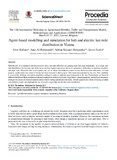Mostrar el registro sencillo del ítem
Agent-based modelling and simulation for hub and electric last mile distribution in Vienna
| dc.creator | Ballano Biurrun, Aitor | es_ES |
| dc.creator | Al-Rahamneh, Anas | es_ES |
| dc.creator | Serrano Hernández, Adrián | es_ES |
| dc.creator | Faulín Fajardo, Javier | es_ES |
| dc.date.accessioned | 2023-05-05T17:47:33Z | |
| dc.date.available | 2023-05-05T17:47:33Z | |
| dc.date.issued | 2023 | |
| dc.identifier.citation | Ballano, A., Al-Rahamneh, A., Serrano-Hernandez, A., Faulin, J. (2023) Agent-based modelling and simulation for hub and electric last mile distribution in Vienna. Procedia Computer Science, 220, 718-723. https://doi.org/10.1016/j.procs.2023.03.094. | en |
| dc.identifier.issn | 1877-0509 | |
| dc.identifier.uri | https://hdl.handle.net/2454/45246 | |
| dc.description | Trabajo presentado en: The 12th International Workshop on Agent-based Mobility, Traffic and Transportation Models, Methodologies and Applications (ABMTRANS) March 15-17, 2023, Leuven, Belgium | es_ES |
| dc.description.abstract | With the rise of e-commerce and door-to-door sales, last-mile deliveries are gaining more and more importance. As a result, last-mile distribution has become one of the most sensitive logistics processes due to its uniqueness, difficulties in meeting schedules, and high costs. Therefore, this work explores the use of urban consolidation centers to ease these last-mile difficulties. For that purpose, a hub in the city center of Vienna has been selected to deliver up to 150 clients disseminated by the city. This suitability is assessed by defining convenient simulation settings in order to replicate parcel demands in the city. Experiments are based in different hub-based fleets (traditional internal combustion vehicles or electric cargo bikes), demand patterns, and delivery frequency strategies by means of a biased randomization vehicle routing optimization heuristic. Results quantify the effects of having an urban consolidation center and highlight the use of electric cargo bikes for the last-mile distribution. | en |
| dc.description.sponsorship | This work has been partially supported by the Spanish Ministry of Science, Innovation, and Universities (RED2018-102642-T; PID2019-111100RB-C22/AEI/10.13039/501100011033) and the SEPIE Erasmus+ Program (2019-I-ES01-KA103-062602). Additionally we acknowledge the support from the Public University of Navarra for Young Researchers Projects Program (PJUPNA26-2022). | en |
| dc.format.mimetype | application/pdf | en |
| dc.language.iso | eng | en |
| dc.publisher | Elsevier | en |
| dc.relation.ispartof | Procedia Computer Science 220, 2023 | en |
| dc.rights | © 2023 The Authors. This is an open access article under the CC BY-NC-ND license. | en |
| dc.rights.uri | http://creativecommons.org/licenses/by-nc-nd/4.0/ | |
| dc.subject | Last-mile distribution | en |
| dc.subject | Logistics | en |
| dc.subject | Simulation | en |
| dc.subject | Optimization | en |
| dc.subject | Heuristics | en |
| dc.title | Agent-based modelling and simulation for hub and electric last mile distribution in Vienna | en |
| dc.type | Artículo / Artikulua | es |
| dc.type | info:eu-repo/semantics/article | en |
| dc.date.updated | 2023-05-05T17:27:27Z | |
| dc.contributor.department | Institute of Smart Cities - ISC | en |
| dc.rights.accessRights | Acceso abierto / Sarbide irekia | es |
| dc.rights.accessRights | info:eu-repo/semantics/openAccess | en |
| dc.identifier.doi | 10.1016/j.procs.2023.03.094 | |
| dc.relation.projectID | info:eu-repo/grantAgreement/MICIU//RED2018-102642-T | en |
| dc.relation.projectID | info:eu-repo/grantAgreement/AEI/Plan Estatal de Investigación Científica y Técnica y de Innovación 2017-2020/PID2019-111100RB-C22/ES/ | en |
| dc.relation.publisherversion | https://doi.org/10.1016/j.procs.2023.03.094 | |
| dc.type.version | Versión publicada / Argitaratu den bertsioa | es |
| dc.type.version | info:eu-repo/semantics/publishedVersion | en |
| dc.contributor.funder | Universidad Pública de Navarra / Nafarroako Unibertsitate Publikoa, PJUPNA26-2022 | es_ES |



